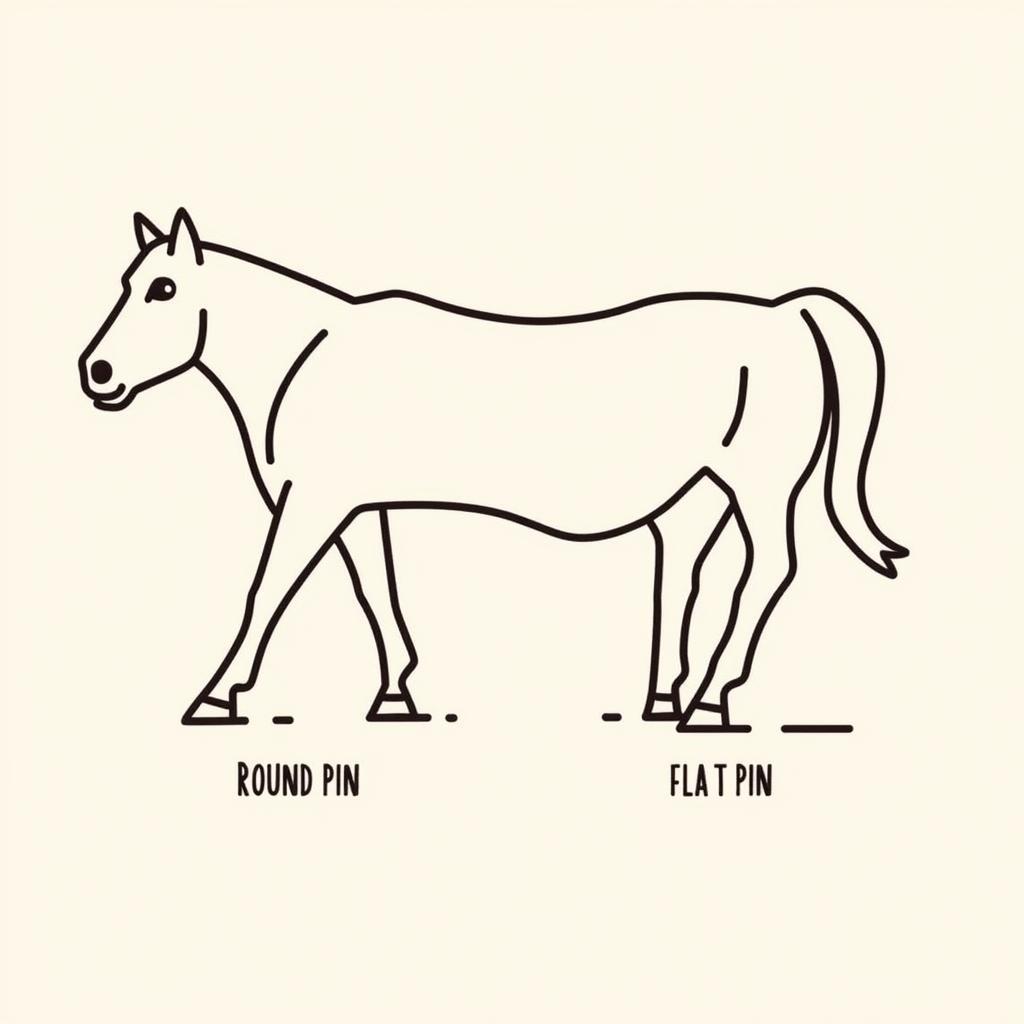Round Pin Horses, a term often used in online horse sales and discussions, can be confusing. What exactly does it mean? This article dives deep into the meaning of “round pin horse,” exploring its implications for horse ownership and dispelling common misconceptions.  Round Pin Horse Illustration
Round Pin Horse Illustration
Many first-time horse buyers encounter the term “round pin” and wonder about its significance. It’s not a breed, a color, or a discipline. Instead, “round pin” refers to the shape of the horse’s hip bones. Specifically, it describes a horse with a rounded croup, lacking the prominent, flat point of the hip often seen in well-muscled performance horses. While some associate a round pin with poor conformation, it’s crucial to understand that this isn’t always the case.
Decoding the Round Pin: Conformation and Performance
The shape of a horse’s hip, whether round or flat, can be influenced by several factors. Genetics plays a significant role, as some breeds naturally have a more rounded croup. Muscling also contributes significantly. A horse lacking muscle development in the hindquarters will appear to have a rounder pin, even if its underlying bone structure is well-angled. Age and overall condition also influence the appearance of the hip. Young horses, particularly those still growing, often have a rounder pin that develops as they mature and build muscle. Similarly, underweight or poorly conditioned horses might exhibit a rounder pin due to muscle loss. You might be looking for english horses for sale and come across this term.
Is a Round Pin a Problem?
Not necessarily. A round pin itself isn’t a defect. It’s simply a descriptive term for the shape of the hip. While a flat, well-muscled hip is often desirable in performance horses, especially those engaging in disciplines requiring powerful propulsion, a round pin doesn’t automatically disqualify a horse from athletic pursuits.
“A round pin doesn’t define a horse’s athletic ability,” says renowned equine veterinarian, Dr. Amelia Stewart. “While it might indicate a need for targeted muscle development, many horses with round pins perform exceptionally well with proper conditioning.”
Assessing the Whole Horse: Beyond the Round Pin
When evaluating a horse, it’s vital to consider the overall conformation, not just the shape of the hip. Balance, proper angles in the legs, and a well-developed topline are crucial factors. A horse with a round pin but otherwise excellent conformation might still be a suitable prospect, especially for recreational riding. If you’re considering purchasing a horse with a round pin, consult with a veterinarian or experienced horse professional. They can assess the horse’s overall conformation and provide guidance based on your intended use. Perhaps you’re considering portable horse stalls for your new horse.
What Does a Round Pin Tell Us?
A round pin can offer insights into a horse’s current condition and potential. It can highlight areas for improvement in muscle development and conditioning programs.
“Evaluating the round pin in conjunction with the rest of the horse’s conformation helps us tailor training and management,” explains equine trainer, John Carter. “By focusing on building strength and muscle, we can often improve the horse’s overall athleticism and performance.”
Conditioning and Management for Horses with Round Pins
Targeted exercises can help develop the hindquarter muscles, improving the appearance and functionality of the hip. Hill work, lunging, and specific riding exercises can be beneficial. Proper nutrition is also crucial. Providing a balanced diet with adequate protein supports muscle growth and development. Remember, building muscle takes time and consistency. If you’re interested in horse boarding charleston sc, consider their approach to conditioning.
Looking for a specific breed? Perhaps you’re searching for information on one ac horse. Or are you looking to improve your horse’s diet with a priefert horse feeder?
In conclusion, the term “round pin horse” describes the shape of the hip, not the horse’s overall quality. While a flat, muscular hip is often preferred, a round pin isn’t necessarily a flaw. By considering the entire horse and implementing appropriate conditioning, horses with round pins can thrive and perform well in various disciplines.
FAQ
- What is a round pin horse? A horse with a rounded croup, lacking a prominent hip point.
- Is a round pin bad? Not inherently. It depends on the overall conformation and intended use.
- Can a round pin horse be athletic? Yes, with proper conditioning and training.
- How can I improve a horse’s round pin? Targeted exercises and proper nutrition can build hindquarter muscles.
- Should I avoid buying a horse with a round pin? Not necessarily. Consider the entire horse and consult a professional.
- What breeds are prone to round pins? Some breeds naturally have more rounded croups.
- Does a round pin affect breeding? It can influence offspring conformation, but it’s not a disqualifying factor.
For further assistance, contact us at Phone: 0772127271, Email: [email protected], or visit us at QGM2+WX2, Vị Trung, Vị Thuỷ, Hậu Giang, Việt Nam. Our customer service team is available 24/7.